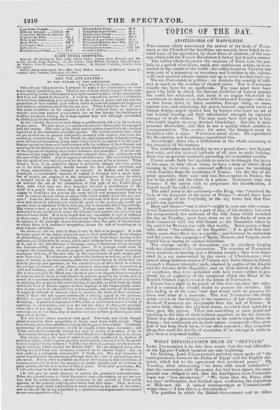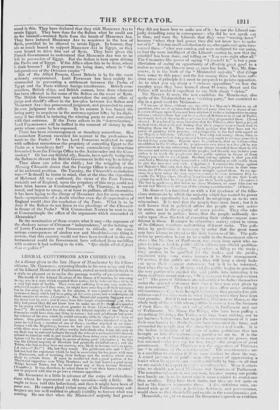WHAT DIPLOMATISTS MEAN BY " SETTLED." LORD hums:am:1N is by this
time aware that the real difficulties of the Egypto-Turkish question are only beginning. On Monday, Lord PALMERSTON'S morning organ spoke of it the correspondence between the Pasha of Egypt and the English Ad- miral, which led to the agreement that produced peace." On Tuesday, after announcing " we learn with much satisfaction" that the convention with Mminsirr ALL had been signed, the same journal was obliged to add, that the iutelligence from Constanti- nople was " less satisfactory." " We learn that the Porte, after ten days' deliberation, had decided upon confirming the deposition. of Mehemet Ali. A valued correspondent at Constantinople writes thus—' I fear this is a determination.'"
The position in which the British Government and its Allies
stand is this. They have declared that they wish MEHEMET Am to retain Egypt. They have done for the Sultan what he could not do for himself—wrested Syria from the hands of Meneetser They have induced Mensener ALT to acquiesce in the loss of Syria, provided he be allowed to retain Egypt. In honour, they are as much bound to support MEHEMET Ara in Egypt, as they were bound to drive him out of Syria. They have given the French Government to understand that MEHEMET ALL was to be
left in possession of Egypt. But the Sultan is bent upon driving the Pasha out of Egypt. Ifthe Allies allow this to be done, where is their honour? If they prevent its being done, where is " the independence of the Ottoman empire" ?
But of the Allied Powers, Great Britain is by far the most seriously compromised. Lord PONSONBY has been mainly in- strumental in preventing a settlement between the Pasha of Egypt and the Porte without foreign interference. British com- manders, British ships, and British cannon, have done whatever has been effected in the name of the Sultan on the coast of Syria. The British Government has undertaken the conjoint office of judge and sheriff's officer in the law-plea between the Sultan and MEIIEMET Ant—has pronounced judgment, and proceeded to carry its own judgment into effect. By its cannon it has forced the losing party to acquiesce in the sentence against him; by its diplos macy it has failed in inducing the winning party to rest contented with that sentence. If the Porte adhere to its "determination," Lord PALMERSTON will be baffled in the moment of victory by the party whose cause he has espoused. There has been mismanagement or treachery somewhere. IIns Commodore NAPIER exceeded his warrant in the professions he made to the Pasha? Or has Lord PONSONEY neglected to urge with sufficient earnestness the propriety of conceding Egypt to the Pasha as a hereditary fief? Or were contradictory instructions forwarded from the Foreign Office to the Ambassador and the Com- modore? Or has our faithful ally, Russia, been quietly instigating the Sultan to thwart the British Government in the way he is doing? Time alone can solve the riddle ; but the wriggling of the Morning Chronicle shows that the Foreign Office is already aware of its awkward position. On Tuesday, the Chronicle's consolation was." It should be borne in mind, that at the time the deposition of Mehemet Ali was confirmed, the views of the Four Powers certainly not of England, upon the propriety of this step, could not have been known at Constantinople." On Thursday, it veered rouud, and began to unsay, or at least to palliate, all the enormities it has been laying to the charge of MEHEMET Am for some months hack—symptomatic of a doubt whether even the disapprobation of England would alter the resolution of the Porte. What is to be done if the Sultan do not listen to the pleadings of the Chronicle in favour of the Pasha? Will Commodore APIER be sent to try at Constantinople the effect of the arguments which succeeded at Alexandria?
Be the termination of these events what it may—the exposure of the shadowy nature of Ottoman "independence," or the holding up of Lords Perztenserox and PONSONRY to ridicule, or the more serious consequences of aimless war and bloodshed—one thing is certain, that this country would not have been involved in the em- barrassment could its Government have refrained from meddling with matters it had nothing to do with. " Que Aire Ans cc golere ?"



























 Previous page
Previous page